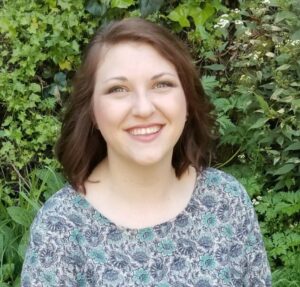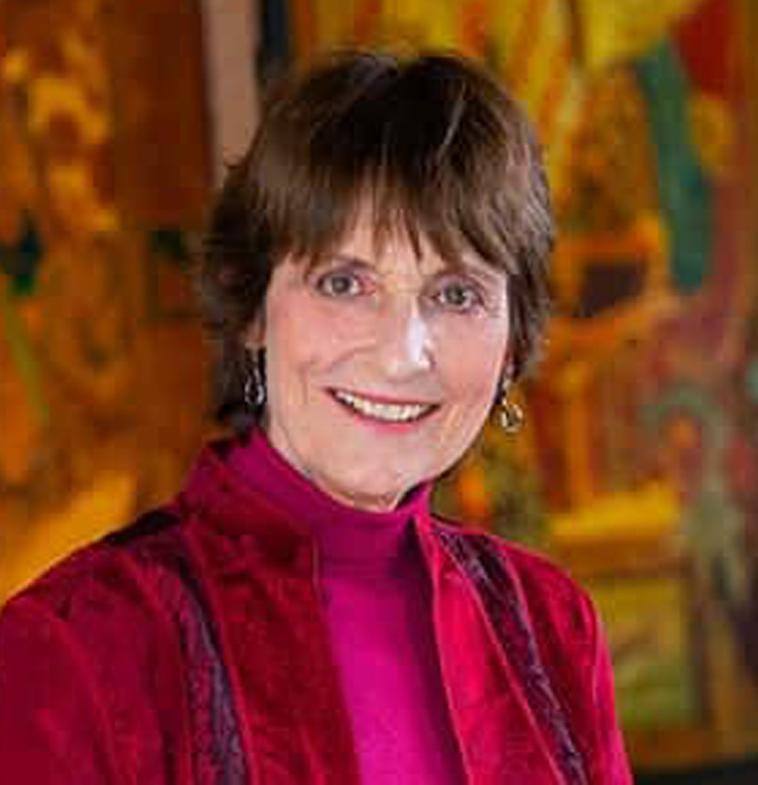 Libby Tyson is a life-long learner who describes her ideal work as something that challenges her to think in different ways while making a lasting impact in the world. That is why Libby is a doctoral student the Department of History at American University and 2021 Graduate Collections. That is also why she applied to be an Archival Fellow at the National Women’s History Museum, where she heads the “Women Writing History Project,” which is gathering stories from women during these historic times of the Coronavirus Pandemic. Libby said that it wasn’t until her undergraduate program that she fully realized that people in history were just people dealing with issues like us. Before that, she says historical figures were more like two-dimensional action figures and regrets that she didn’t realize earlier that history basically is “about being human and what it is to be human.”
Libby Tyson is a life-long learner who describes her ideal work as something that challenges her to think in different ways while making a lasting impact in the world. That is why Libby is a doctoral student the Department of History at American University and 2021 Graduate Collections. That is also why she applied to be an Archival Fellow at the National Women’s History Museum, where she heads the “Women Writing History Project,” which is gathering stories from women during these historic times of the Coronavirus Pandemic. Libby said that it wasn’t until her undergraduate program that she fully realized that people in history were just people dealing with issues like us. Before that, she says historical figures were more like two-dimensional action figures and regrets that she didn’t realize earlier that history basically is “about being human and what it is to be human.”
The Women Writing History Project is anything but 2D. Libby says it shows the resilience and creativity of how people behave during a crisis. And this gives her hope for the future. This creativity has been expressed in a multitude of ways. Libby said that no format was required for the submission of journals. While some women submitted traditional diaries, others made films, recorded memos on their cell phones, or recorded conversations with their families. One person submitted a woven project to express her thoughts about the pandemic, and another simply shared how having her favorite tea gave her joy. The stories are as different as the people who submitted them, but they all contain a common thread of creativity and the resilience necessary for weathering the worst of times.
That common thread, Libby says, “is that the journals speak to bigger themes, but also allow for smaller moments of how people are finding peace within harder times.” Dr. Nancy said, “I think that’s what the pandemic will show that some of the things that were most important are always important. And that we should never forget where we come from and really what makes us strong and what makes us healthy and what gives us joy.” Libby agreed, and said, “There isn’t one overarching story because there are so many and they are so vast, but at the same time, they are really beautiful.” She concludes, “That’s the underlying thread, I guess, they are really beautiful and very intense.”
The National Women’s History Museum (NWHM)
Founded in 1996, NWHM is the nation’s leading women’s museum. Although it still only has a virtual presence, there are plans for a physical location in Washington, D.C. in 2022. NWHM is dedicated to uncovering, interpretating and celebrating women’s diverse contributions to society through preserving history and through educational outreach. All of its activities shed light on the countless untold stories of women throughout history. Libby says, “It also serves as a base for everyone to inspire and experience and collaborate and amplify women’s impact in all time periods.” The Women Writing History Project was the museum’s response to the pandemic, recognizing that while the pandemic affected the entire world, it had/has a special impact on women, with jobs going virtual, childcare concerns and an abundance of layoffs and furloughs. The museum created a space for people to donate their pandemic and coronavirus journals to reflect the changing times and pressures brought on by the pandemic and contribute to a larger archive of pandemic stories.
The Women Writing History Project
 Libby says that NWHM plans to have a virtual library for viewing the journals by summer 2021. Until then, you can submit a journal or find out more information by clicking on the public programs and events tab on their website womenshistory.org to see the Women Writing History, a Coronavirus Journaling Project. You can also access the project on social media #historyisnow. The NWHM social handles are @womenshistory on Facebook, Twitter and Instagram. Libby also invites anyone with specific questions to e-mail her directly at [email protected].
Libby says that NWHM plans to have a virtual library for viewing the journals by summer 2021. Until then, you can submit a journal or find out more information by clicking on the public programs and events tab on their website womenshistory.org to see the Women Writing History, a Coronavirus Journaling Project. You can also access the project on social media #historyisnow. The NWHM social handles are @womenshistory on Facebook, Twitter and Instagram. Libby also invites anyone with specific questions to e-mail her directly at [email protected].
Listen to this interview for more of Libby’s personal story and to learn why she believes museum archivists and curators are not only preserving our experiences and archiving our stories, but doing some of the most important work for the future.

